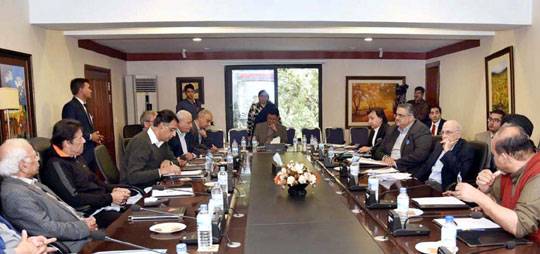ISLAMABAD - Prime Minister Imran Khan Sunday approved two key frameworks, one dealing with the structural reforms in the national economy and the other on social protection.
Chairing a meeting of Economic Advisory Council (EAC), the prime minister approved the two policy frameworks for the medium-term.
They aim at bringing structural reforms in the economy to achieve rapid national progress, reduction in poverty levels, addressing the challenges in health sector and taking care of vulnerable segments of society.
Prepared and recommended by the EAC, these frameworks are meant for laying the foundation of a sustainable, inclusive, job creating and export-oriented economic growth strategy as enunciated in the government’s 100-day plan.
The approval was given following a detailed briefing by the experts who had prepared the frameworks in the light of the proposals of different working groups of the council.
The social protection framework aims at ensuring protection to the vulnerable and deprived segments of society. The comprehensive framework focuses on the challenges of poverty, health, stunted growth, education and aims at enabling the youth to realise their potential and extricate themselves out of generational poverty traps.
One social protection project has already been initiated by the prime minister under which shelter houses are being built for the homeless people in the major cities of the country.
As building of permanent structures requires considerable time, the government has started setting up makeshift shelter and providing food to homeless people in Lahore to protect them against harsh winter season. The model will be replicated in other cities as well.
Since assuming power, PTI government was entangled in managing the national economy which according to experts was in extremely bad shape. The balance of payment issue due to wide gap between the import and export bills had acquired alarming situation, leaving the country with dollars hardly sufficient for two months import bill.
The meeting of the Economic Advisory Council was attended by ministers Finance Minister Asad Umar, Planning Minister Khusro Bakhtiar, Adviser to PM Dr Ishrat Hussain, former State Bank governor Syed Saleem Raza, Lahore School of Economics professor Dr Naved Hamid, economist Sakib Sherani, LUMS associate professor Dr Faisal Bari, Pakistan Institute of Development Economics VC Dr Asad Zaman, Sustainable Development Policy Institute ED Dr Abid Qayyum Sulehri, Governor State Bank Tariq Bajwa, Finance Secretary Arif Ahmad Khan, Advisor/Executive Director General (IERU) Dr Khaqan Hassan Najeeb and other senior officials.
The meeting was briefed on the policy recommendations for economic reforms that included mobilising finance for development, enhancing exports and strengthening SMEs, tax reforms, job creation impact of major policy actions and social protection priorities in Pakistan, in the light of the deliberated proposals of the working groups of the advisory council.
The policy recommendations were finalised to focus on acceleration of under-utilised areas including agriculture, housing, and small and medium enterprises in terms of incentives, reliance on export-oriented and labour intensive growth, reversal of anti-export bias, enhanced system automation and use of technology, transparency in trade regime, facilitating importers, job creation through skill development, ease of doing business through business friendly environment while focusing on productivity and moving on technology sophistication.
Ruling PTI leaders said the issue of current account deficit has been managed to a great extent due to untiring efforts of Prime Minister Imran Khan and his economic team. The financial package from Kingdom of Saudi Arabia proved a key role while the pledge of support by China and other friendly countries including UAE has boosted investors’ confidence, they added.
The PTI figures said, the government would now pay attention to long-term economic measures to put the economy on right track with a focus on increase in exports and cut in import bill.
They were optimistic that with plugging the pilferages in shape of tax evasion, power theft and such other things the country’s economy could be put on sound footing in the next few years.
PM okays economic, social protection plans






